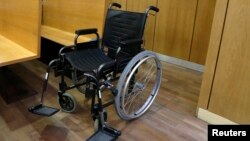People with disabilities say community members should take the lead in finding solutions to challenges faced by disabled people in Zimbabwe.
They say genuine community participation is the key to finding lasting solutions to problems they encounter on a day to day basis.
For example, Program officer for the National Council of Physically-Disabled Persons of Zimbabwe, Simbarashe Mukanganise, says gardening projects for the disabled in Tanda, Dhuze and St. Michaels in Mondoro, only succeeded after they started working closely with others in their communities, including the local leadership.
“We witnessed change in terms of positive change towards persons with disabilities after having interacted with the local chief and having talked with him about the need to recognize people with disabilities as equal citizens. He then gave the former rest camp a piece of land that has got buildings. During the war this place was used to train soldiers and was not being utilised by the local community,” says Makunganise.
He says community participation promotes shared responsibility and sustainability for projects for the disabled in rural communities.
“People without disabilities said they were going to help people with disabilities to run these projects. So you have a situation where if a community is changed to have a positive mind there is ownership of projects and the need to make the environment suitable for people with disabilities.”
NEGATIVE ATTITUDES
Thirty-two year-old Josphat Ganya, who comes from Brown village in the Mt. Darwin resettlement area and is an amputee with an artificial leg, is studying for a diploma in electrical power at Harare Polytechnic.
He says people in communities should work together to change negative attitudes that discourage some people who are able-bodied from assisting the disabled.
“If you brush off the ignorance and focus on members in the community and help them sustain their lives, equipment to support their projects, those with disabilities can live better lives.”
Forty four year old Tongai Chinhaire from Dzivaresekwa is visually-impaired and walks with the aid of a white cane. He says when able-bodied people work closely with those with disabilities; they will understand them better and know what assistance to give them.
“The community has to understand what needs to be done through knowledge, for example if we have someone who is blind with a white cane. We should work together with one who is blind. The community has to understand all the problems that are faced by blind people so as to avoid negligence.”
THEATER AND DISABILITY
The call for community participation in disability projects is supported by celebrated playwright, actor and theatre director, Cont Mhlanga. For the past 14 years he has been working on a theatre project to influence community attitudes towards people with disabilities.
Mhlanga, who is founder of Amakhosi Theatre Productions, says it is important to fuse disabled actors and actresses in theatre productions so that people appreciate the challenges they face.
In one of his productions he requested local people to host disabled actors at their homes for a couple of days so that they would also experience the challenges faced by people with disabilities.
“There we got impact because its drama yes, but it’s what we call reality drama. We discovered that it made a big impact. Those people are living with disabilities and are not even talking about their disabilities. But you have to serve them food everyday, you have to take them to the toilet because you are hosting them. After two days that family has changed completely.”
Mhlanga further says more impact was achieved when influential people within the community, like headmen, health workers, care-givers and extension officers were involved in the productions.
“We would target community champions and leaders like real drama. That we found very effective. We would then call everybody. You can image this actress who was going to fetch water in a normal borehole in the village. Everyone in that community got shocked, everyone trying to help her, you know what I mean. But they didn’t realize that they were part of the drama. They were thinking this is just a visit and the person is busy recording. She is not even talking about herself,” says Mhlanga.
YOUTH WITH DISABILITIES
An icon within the Zimbabwean student debate movement in universities, polytechnics and teachers’ colleges, Innocent Batsani Ncube, says conversations with disability themes will enable communities to reflect on problems facing people with disabilities.
He says youths with disabilities will particularly be empowered if entire communities rally behind their cause.
“It’s not only about putting issues of disability on the agenda but also creating space for young people within the colleges and even outside, those living with disability to be able to be given the same platform to debate. There is need to go beyond putting issues of disability on the agenda and look at even what kind of language are we using, how can we transform debate to speak to people who use sign language, because language is not just about speaking in English.”
Ncube adds community participation in disability projects will make a huge difference in the way people with disabilities are living in the country.






